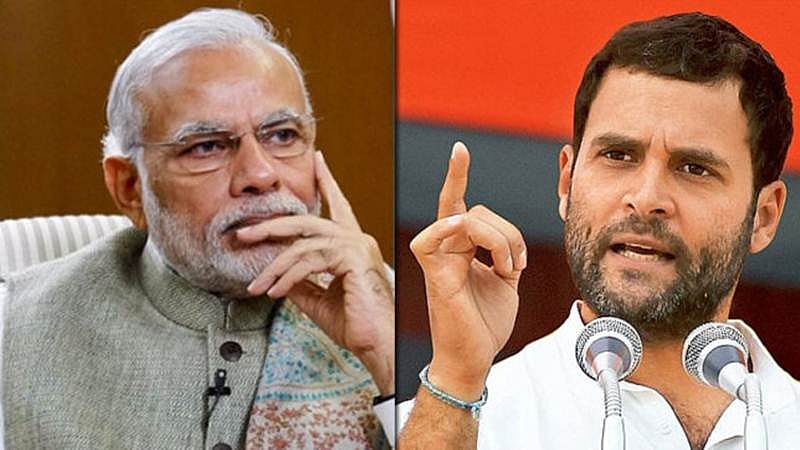Electioneering for the Karnataka State Assembly polls has reached its final lap and by the time we meet in this column next Monday, the voting in the state would have been over and all eyes would have set on May 15, when the counting of ballot is scheduled to take place all over Karnataka. This is an hour of anxiety and stress for all parties in the fray, particularly the Bharatiya Janata Party (BJP), Congress and the Janata Dal (S). While the BJP is making every attempt to wrest power from the Congress once again to take revenge of its defeat in 2013, the ruling Congress in Karnataka is trying to retain its fort. H D Deve Gowda’s Janata Dal (S) is angling to become the tilting factor.
As the actual polls are fast approaching, various polls and surveys are also hitting headlines. Most of the surveys are showing a slight advantage to the BJP while some do believe that the Congress would pass the test. While stating that the Karnataka polls would be the BJP’s gateway to the south, BJP president Amit Shah seems to have forgotten the fact that the BJP was in power in the State earlier but botched it up because of a corrupt administration. The party’s continued dependence on B S Yeddyurappa and the Reddy brothers may not go down well with a discerning urban voter.
Obvious and unseen factors
There are many obvious and unseen factors likely to overshadow the voting pattern. The after-effects of demonetisation and the GST cannot be wished away. Shah’s assertion of not having an alliance with the JD(S) after the elections can only be taken with a pinch of salt given the way the BJP has come to power in many States after “making adjustments” with adversaries. Those, who talk to Shah for newspaper/TV interviews, have failed to solicit any response from him on the economic situation or the contentious Cauvery issue, which should matter more to the people of the State than dwelling on the effect of caste equations on the elections.
Optimism is undoubtedly a virtue in Indian politics but undue or misplaced optimism might hardly yield dividends. For the BJP, the gateway opened much earlier but its tenure in 2008 was marked by corruption. Infighting too ruined the party’s prospects. Pre-poll surveys, for what they are worth, point to a hung Assembly, so the best possible scenario would be to once again have a tie-up with the JD(S). Karnataka was the only State in the south that opened its doors to the BJP but there it squandered the mandate. The BJP’s chances of making an impression on voters on its own in Andhra Pradesh, Telangana, Tamil Nadu and Kerala are remote as it is not even a marginal player in those states. Thus, Shah and his party have a Herculean task ahead; mere rhetoric is just rhetoric.
Since its inception, Karnataka has seen many changes of guard. It witnessed the regime of Nijalangappa, Veerendra Patil, Devraj Urs, Veerappa Moyili, Gundu Rao and Yeddyurappa. All these chief ministers belonged to different political philosophies, style of functioning and parties. In the process, though the state had political ‘stability’ in theory, in practice, the state always remained instable. This instability has proved to be fatal for the people, who lost many opportunities of progress and prosperity during the last three decades. The people of the state are really tired of petty party politics and have started looking for the government that would rise above party politics and personality cult. Unfortunately, none of the major players in the fray fit this bill.
Voters in a quandary
Some opinion polls do show a thin edge to the BJP over the Congress. If that is actually translated into voting pattern, Yeddyurappa would return to power and a circle would be completed. It may be recalled that the Congress had run a bitter campaign against Yeddyurappa’s ‘corrupt’ government and had successfully wooed the people to dethrone Yeddyurappa. A so called ‘unholy’ nexus between the leaders of the state and mine-owner Reddy brothers was the talking point and the Government was rejected by the voters. However, Yeddyurappa’s successor Congress’s Siddaramaiah proved to be no better. Thus, the voters now seem to be in a quandary.
In case, neither the BJP nor the Congress reach the magic figure to establish complete majority, Deve Gowda’s JD(S) would jump in the ring and play its own game. If JD(S) votes prove to be the tilting factor, the shrewd politician that Deve Gowda is, will play his cards carefully and would demand his pound for flesh. And perhaps the price would be too heavy for either of the party to pay. In that situation, the state would remain in a state of political instability for few years more. That would take the obvious toll on its progress.
Let’s all hope that beyond party lines and commitments, the state of Karnataka gets an able and stable government to rule for the next 10 years at least.
Bharatkumar Raut is a political analyst and former Member of Parliament (RS).






